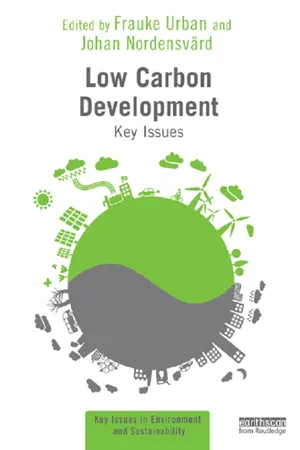
Low Carbon Development
Key Issues
- 352 pages
- English
- PDF
- Available on iOS & Android
About this book
Low Carbon Development: Key Issues is the first comprehensive textbook to address the interface between international development and climate change in a carbon constrained world. It discusses the key conceptual, empirical and policy-related issues of low carbon development and takes an international and interdisciplinary approach to the subject by drawing on insights from across the natural sciences and social sciences whilst embedding the discussion in a global context.
The first part explores the concept of low carbon development and explains the need for low carbon development in a carbon constrained world. The book then discusses the key issues of socio-economic, political and technological nature for low carbon development, exploring topics such as the political economy, social justice, financing and carbon markets, and technologies and innovation for low carbon development. This is followed by key issues for low carbon development in policy and practice, which is presented based on cross-cutting issues such as low carbon energy, forestry, agriculture and transportation. Afterwards, practical case studies are discussed from low carbon development in low income countries in Africa, middle income countries in Asia and Latin America and high income countries in Europe and North America.
Written by an international team of leading academics and practitioners in the field of low carbon development, this book is essential reading for students, academics, professionals and policy-makers interested in the fields of low carbon development, climate change mitigation, climate policy, climate change and development, global environmental change, and environment and development.
Tools to learn more effectively

Saving Books

Keyword Search

Annotating Text

Listen to it instead
Information
Table of contents
- Cover
- Title Page
- Copyright Page
- Table of Contents
- List of figures and tables
- Notes on contributors
- Acknowledgements
- List of acronyms and abbreviations
- Preface
- PART 1 Introduction
- PART 2 The politics of low carbon development
- PART 3 The social dimensions of low carbon development
- PART 4 The economics of low carbon development
- PART 5 Technology and innovation for low carbon development
- PART 6 Key issues for low carbon development in policy and practice
- PART 7 Key issues for low carbon development in low, middle and high income countries: Case studies
- Final thoughts
- Index
Frequently asked questions
- Essential is ideal for learners and professionals who enjoy exploring a wide range of subjects. Access the Essential Library with 800,000+ trusted titles and best-sellers across business, personal growth, and the humanities. Includes unlimited reading time and Standard Read Aloud voice.
- Complete: Perfect for advanced learners and researchers needing full, unrestricted access. Unlock 1.4M+ books across hundreds of subjects, including academic and specialized titles. The Complete Plan also includes advanced features like Premium Read Aloud and Research Assistant.
Please note we cannot support devices running on iOS 13 and Android 7 or earlier. Learn more about using the app